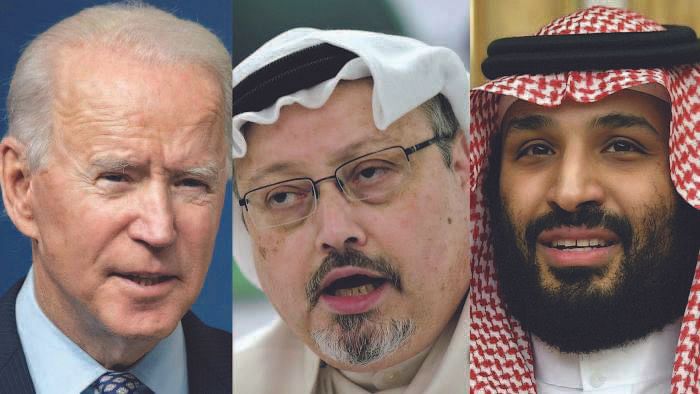On October 2, 2020 Joe Biden who was then the Democratic party nominee for the presidency of the United States marked the second anniversary of the murder of Jamal Khashoggi by issuing a hard-hitting statement “mourning” his death and demanding “accountability”. A month later he won the election. The post-election period was tortuous because of his rival, president Donald Trump, simply refusing to accept defeat. Finally, US institutions prevailed and Biden was sworn in as president on January 20, 2021. But the political and judicial contestations of the twelve weeks between the election and Biden’s oath-taking are not germane to the Khashoggi statement. What is pertinent are the principles that candidate Biden laid out and the extent to which president Biden has observed them.
In his statement Biden made obvious his belief that the ultimate responsibility for Khashoggi’s murder lay with Saudi Arabia’s crown prince Mohammed bin Salman. The statement’s opening sentence makes that clear despite the use of the word “reportedly”. It reads “Two years ago, Saudi operatives, reportedly acting at the direction of Saudi Crown Prince Mohammed bin Salman murdered and dismembered Saudi dissident, journalist, and US resident Jamal Khashoggi”. Not only did Biden pay tribute to Khashoggi he implicitly made it clear that he did not consider the Khashoggi murder a rogue operation but a deliberate one. For, if it was the former Biden would have stressed the need for justice and not ventured into the area of bilateral US-Saudi ties as he did.
He declared “Under a Biden-Harris administration, we will reassess our relationship with the Kingdom, end US support for Saudi Arabia’s war in Yemen, and make sure that America does not check its values at the door to sell arms or buy oil. America’s commitment to democratic values will be a priority even with our closest security partners”. Through these words candidate Biden was explicitly stating that the non-observance of human rights would adversely impact bilateral ties even where American security and economic interests were involved.
President Biden has clearly retreated from the high bar on human rights set by candidate Biden. He has taken action that has embarrassed Mohammed bin Salman but has sought to protect US interests in Saudi Arabia. This is clear from secretary of state Antony Blinken’s statement of February 26. It revealed that the Biden administration had made public an intelligence report on Khashoggi’s murder and had imposed visa restrictions on “76 Saudi individuals believed to have been engaged in threatening dissidents overseas including but not limited to the Khashoggi killing”. This decision was part of a new general visa policy called the “Khashoggi Ban” which would apply to individuals and members of the families of those who undertake “counter-dissident” extraterritorial counter-dissident activities.
Clearly, the Khashoggi ban is meant to show to the liberal community in the US that unlike his predecessor Biden is tough on human rights issues. This is a classic dodge that governments undertake: whenever it is necessary to go soft in a high-profile individual case attempts are made to shift focus to general policies and resort to high rhetoric. This is evident from excluding Mohammed bin Salman from the visa ban despite the disclosures made in the intelligence report.
US intelligence report noted that Mohammed bin Salman “approved” “the operation to capture or kill” Khashoggi in Istanbul. Of the fifteen-member team that went to Istanbul for the operation against Khashoggi seven belonged to crown prince’s “elite personal protective detail, known as the Rapid Intervention Force”. Associated with the operation was Saud al-Qahtani, a close advisor of Mohammed bin Salman. US intelligence also based its assessment on the crown prince’s “support of using violent measures to silence dissidents abroad, including Khashoggi”. All in all, this constitutes a damning indictment against the Saudi crown prince who has effectively been in charge of the entire array of the Saudi governmental apparatus since 2017. Also, it removes the caveat through the use of the word “reportedly” in candidate Biden’s 2010 statement on the Khashoggi murder.
The Khashoggi operation was not the only one taken by Saudi Arabia against dissidents living abroad. Some of these have taken place in western countries who have never really publicly expressed their displeasure. This has only emboldened the Saudis through the years. The passivity against the Saudis is in contrast to the high decibel response against Russian action against dissidents living in foreign countries. Not only has the Russian government been held responsible sanctions too have been imposed. It can therefore be concluded that in such matters countries are governed by their perceived national interest instead of real concern for human rights. Thus, candidate Biden’s emphasis on holding even allies to a high bar on human rights president Biden has decisively moved that bar far lower. And that too in a such a brutal case of murder as that of Khashoggi. Has he really acted any differently from his predecessor who condoned Mohammed bin Salman?
What made the Khashoggi murder particularly heinous was the manner in which he was lured into his country’s consulate in Istanbul and a cold-blooded, well planned operation was conducted against him which led to his killing and the dismemberment of his body. Embassies and consulates’ primary responsibilities are to protect their nationals in a foreign country. If they themselves become killing places then the foundations of the diplomatic immunities system between states is itself shaken. That is an aspect that also needs to receive attention arising out of the Khashoggi murder. But Saudi Arabia is a prosperous and influential state and no country wants to ruffle its feathers by making this matter as the reason for examining the global diplomatic immunities angle.






